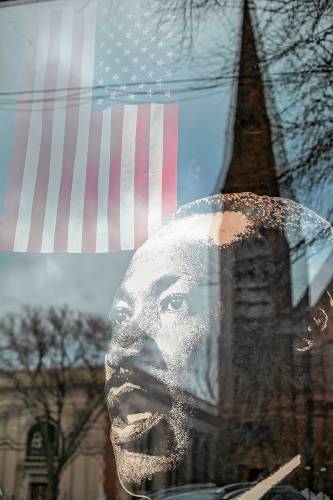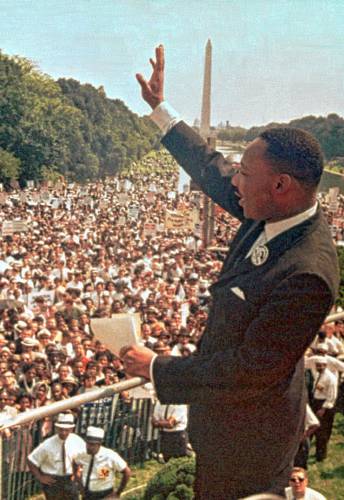Columnist Sara Weinberger: ‘Beloved community’: Living King’s vision of nonviolence
| Published: 01-15-2024 6:02 AM |
Thirty-four years ago today, the United States observed the first federal holiday honoring the life of Rev. Dr. Martin Luther King, Jr. For many years, the day was marked with local celebrations, service projects, and educational workshops celebrating Dr. King’s legacy of non-violence to build a beloved community that recognized the inherent humanity of all people.
Last week, I searched the internet for news of local observances. The Amherst Human Rights Commission will hold a community reading of Dr. King’s speech, “The Quest for Peace and Justice,” at Bang’s Community Center in Amherst at 1 p.m. That event was all that was listed between Springfield and Amherst. Has Martin Luther King Day gone the way of so many Monday holidays, that have become little more than an opportunity for a weekend getaway or a time to take advantage of MLK Day consumer enticements?
And what of this larger than life hero of the civil rights movement? Does his wisdom hold relevance for addressing today’s bleak realities? Has time neutralized the power of Dr. King’s teachings, equating nonviolent resistance with passivity and submission? Can our binary world, which implores us to divide up the world between good and bad, with no room for nuance, learn the value of “… avoiding not only external physical violence but also internal violence of spirit …(to) not only refuse to shoot a man, but … refuse to hate him?” (Rev. Dr. Martin Luther King, Jr.)
In 1968, Coretta Scott King established The Martin Luther King, Jr. Center for Nonviolent Social Change. The King Center was created as, “no dead monument, but a living memorial filled with all the vitality that was his, a center of human endeavor, committed to the causes for which he lived and died.” (Coretta Scott King) Today, The King Center’s CEO, Dr. Bernice A. King is, “inspiring new generations to carry forward his unfinished work, strengthen causes and empower change-makers who are continuing his efforts today … as a beacon of hope and progress, to a world that still desperately needs Dr. King’s voice and message.”
In the days since Oct. 7, I have often wondered how Dr. King might respond to the endless cycle of death and destruction in Israel and Palestine. Dr. King stated in his 1959 Sermon on Gandhi, “The way of violence leads to bitterness in the survivors and brutality in the destroyers. But, the way of non-violence leads to redemption and the creation of the beloved community.”
An increasing number of Palestinians and Israelis, viewing wars and walls as unsustainable and morally reprehensible, have engaged in movement building reminiscent of Dr. King’s vision. “The aftermath of nonviolence is the creation of the beloved community, so that when the battle’s over, a new relationship comes into being between the oppressed and the oppressor.” (Sermon on Gandhi 1959) Israelis and Palestinians have been traumatized by atrocities committed on both sides. Add to this the foolhardy voices of leaders, who proclaim that annihilation or removal of the “other” is the only way to assure safety in a country where two groups have fought war after war to claim their right to this land. And then there’s Israel’s decades-long brutal occupation of Gaza and the West Bank. It’s understandable why “hopeless” may be the word that best describes prospects for peace between Israel and Palestine, where suffering and anguish breed hate and hostility.
May Pundak directs A Land for All, an Israeli-Palestinian movement she describes as an “exercise in political imagination.” Recognizing that both groups are connected to this land, where “nobody is going anywhere,” Land for All’s joint Palestinian and Israeli board is developing a “viable” plan for peace that “speaks to the interests of both peoples.” May, a young mother who wants her children to grow up in a peaceful country, knows it’s not possible unless all mothers can raise their children safely. A Land for All is based on the realization that Palestinians and Jews are interconnected. They invite interested others to recognize that within the dire present is “a moment of opportunity” to join “the life coalition.” How can trust be built in the midst of so much trauma? The members of A Land For All are willing to engage in excruciating conversations, will listen to each others’ pain and anger, remaining committed to the struggle to replace the status quo with an equitable vision for peace.
The movement is taking root, as many organizations like Combatants for Peace and Standing Together are creating “joint spaces for Israelis and Palestinians to share their pain in order to stay united for a just solution that benefits everyone.” Their work, reminiscent of Dr. King’s Beloved Community, is built with the resolve to engage in nonviolent action to defeat injustice.
Article continues after...
Yesterday's Most Read Articles
 Northampton school budget: Tensions high awaiting mayor’s move
Northampton school budget: Tensions high awaiting mayor’s move
 A rocky ride on Easthampton’s Union Street: Businesses struggling with overhaul look forward to end result
A rocky ride on Easthampton’s Union Street: Businesses struggling with overhaul look forward to end result
 ‘None of us deserved this’: Community members arrested at UMass Gaza protest critical of crackdown
‘None of us deserved this’: Community members arrested at UMass Gaza protest critical of crackdown
 Guest columnist David Narkewicz: Fiscal Stability Plan beats school budget overreach
Guest columnist David Narkewicz: Fiscal Stability Plan beats school budget overreach
 More than 130 arrested at pro-Palestinian protest at UMass
More than 130 arrested at pro-Palestinian protest at UMass
 Northampton’s lacrosse mom: Melissa Power-Greene supporting Blue Devils on and off the field
Northampton’s lacrosse mom: Melissa Power-Greene supporting Blue Devils on and off the field
The King Center’s theme of the 2024 observance of Martin Luther King Day is: “It Starts With Me: Shifting the Cultural Climate Through the Study and Practice of Kingian Nonviolence.” I encourage everyone to take some time today to investigate the opportunities that the King Center offers to learn and take action (thekingcenter.org/about-tkc/).
“A true revolution of values will lay hands on the world order and say of war — ‘This way of settling differences is not just. A nation that continues year after year to spend more money on military defense than on programs of social uplift is approaching spiritual death.” — Dr. Martin Luther King, Jr.
Sara Weinberger of Easthampton is a professor emerita of social work and writes a monthly column. She can be reached at columnists@gazettenet.com.



 Columnist John Sheirer: Eclipse eclipsed expectations
Columnist John Sheirer: Eclipse eclipsed expectations Guest columnist Gwen Agna: Why I voted for school board budget
Guest columnist Gwen Agna: Why I voted for school board budget My Turn: Quabbin region will never see any bounty
My Turn: Quabbin region will never see any bounty Frank Higbie: Don’t cancel student debt
Frank Higbie: Don’t cancel student debt
